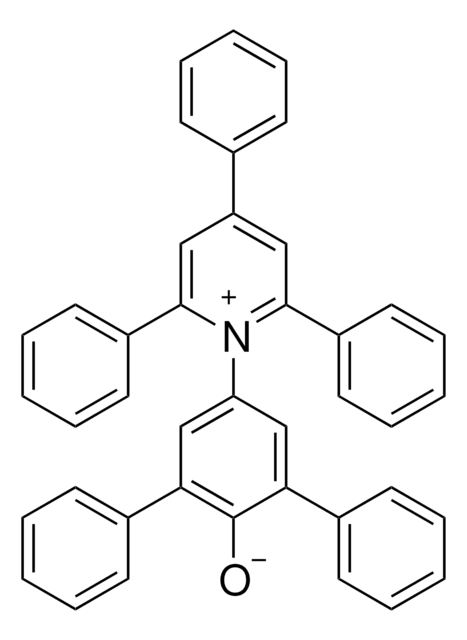All Photos(3)
About This Item
Empirical Formula (Hill Notation):
C12H9NO2
CAS Number:
Molecular Weight:
199.21
Beilstein:
2095656
EC Number:
MDL number:
UNSPSC Code:
12171500
PubChem Substance ID:
NACRES:
NA.47
Recommended Products
Product Name
Indophenol,
form
powder
Quality Level
color
dark green to black
mp
>300 °C (lit.)
solubility
1 M NaOH: 10 mg/mL, clear, blue to very deep blue
application(s)
diagnostic assay manufacturing
hematology
histology
storage temp.
room temp
SMILES string
Oc1ccc(cc1)N=C2C=CC(=O)C=C2
InChI
1S/C12H9NO2/c14-11-5-1-9(2-6-11)13-10-3-7-12(15)8-4-10/h1-8,14H
InChI key
RSAZYXZUJROYKR-UHFFFAOYSA-N
Looking for similar products? Visit Product Comparison Guide
General description
Indophenol is used in hair dyes, redox materials, lubricants, liquid crystal displays, biosensor and fuel cells. It is toxic to fishes and is implicated in environmental pollution.
Indophenol method is common for the determination of ammonia. The reaction gives a blue product, which is measured spectrophotometrically.
Storage Class Code
11 - Combustible Solids
WGK
WGK 3
Flash Point(F)
Not applicable
Flash Point(C)
Not applicable
Personal Protective Equipment
dust mask type N95 (US), Eyeshields, Gloves
Choose from one of the most recent versions:
Already Own This Product?
Find documentation for the products that you have recently purchased in the Document Library.
Customers Also Viewed
Handbook of Acid-Base Indicators (2007)
Marczenko Z and Balcerzak M
Separation, Preconcentration and Spectrophotometry in Inorganic Analysis (2000)
Sonia Senra-Ferreiro et al.
Talanta, 85(3), 1448-1452 (2011-08-03)
A miniaturized method based on liquid-phase microextraction (LPME) in combination with microvolume UV-vis spectrophotometry for monitoring ammonia in waters is proposed. The methodology is based on the extraction of the ion pair formed between the blue indophenol obtained according to
Christen M Cormier et al.
Journal of neurotrauma, 27(10), 1805-1818 (2010-08-12)
Autonomic dysreflexia consistently develops in patients and in rats after severe upper thoracic spinal cord injury (SCI) as a result of exaggerated spinal sympathetic excitation. In this study we induced episodic hypertension in rats after varying degrees of SCI severity
Analía Bortolozzi et al.
The European journal of neuroscience, 18(5), 1235-1246 (2003-09-06)
In the rat, postsynaptic 5-hydroxytryptamine2A receptors medial prefrontal cortex control the activity of the serotonergic system through changes in the activity of pyramidal neurons projecting to the dorsal raphe nucleus. Here we extend these observations to mouse brain. The prefrontal
Our team of scientists has experience in all areas of research including Life Science, Material Science, Chemical Synthesis, Chromatography, Analytical and many others.
Contact Technical Service











